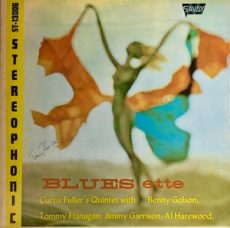
Requisites
Blues-ette ~ Curtis Fuller Quintet | By Eddie Carter
Curtis Fuller is widely regarded as one of the top jazz trombonists. A few nights ago, I enjoyed listening to this morning’s album from the library, and that’s what inspired this discussion of his 1959 release, Blues-ette (Savoy MG-12141/SST-13006). Throughout his more than 65 years in music, Fuller built an impressive catalog of recordings, both as a band leader and as a sideman, including work with Joe Henderson, Lee Morgan, Bud Powell, Wayne Shorter, Jimmy Smith, the Jazz Messengers, and the Jazztet. On this album, he’s joined by fellow Jazztet member Benny Golson on tenor saxophone, Tommy Flanagan on piano, Jimmy Garrison on bass, and Al Harewood on drums. The copy of this album I own is the 1973 U.S. stereo reissue, which shares the original catalog number.
Five Spot After Dark by Benny Golson opens the album. It’s a delightful medium-tempo tune that the front line brings to life with the melody. Curtis begins with a relaxing, welcoming solo. Benny blends each note of the following reading with a joyful energy. Tommy keeps the beat alive in the third interpretation. Jimmy joins the front line for the closing statement, leading to the ending theme and climax. Undecided by Sydney Robin and Charlie Shavers is a catchy tune that opens with the quintet laying down a gorgeous mid-tempo beat on the theme. Fuller takes center stage next with an impressive interpretation. Golson comes right behind him with an irresistible improvisation. Harewood provides a concise, impactful solo alongside both horns, building up to a lively reprise and a satisfying ending.
The title tune, Blues-ette by Curtis Fuller, wraps up the first side with Tommy’s sprightly introduction to the melody’s theme. Curtis sets the mood in the opening statement, delivering an understated and moving narrative. Benny effortlessly rises to the occasion in the following performance. Tommy follows with a dazzling display, then Jimmy caps the solos with a short walk to the ensemble’s close. Benny Golson’s Minor Vamp is anything but, as the second side unfolds, beginning with Garrison and Harewood’s introduction to the lively melody. Golson kicks off the solos, pouring his heart into each note. Fuller gives a captivating performance of lively verses next. Flanagan gets the last word with an energetic solo, ahead of the ensemble’s closing chorus and fadeout.
Love Your Spell Is Everywhere by Edmund Goulding and Elsie Janis begins with the quintet’s medium-tempo theme. Benny takes the lead with an exquisitely crafted performance. Next, Curtis gets into the groove with an exceptional reading that’s cool, smooth, and polished. Tommy executes the closing statement with meticulous execution ahead of the ensemble’s end theme and close. Garrison and Harewood open the door to the quintet’s easygoing unison melody to Curtis Fuller’s Twelve-Inch. Golson takes the stage first with a sweet and tasty reading. Fuller makes his case next with a captivating contribution. Flanagan moves sprightly along in the third solo, and Garrison puts the exclamation point on the song before the quintet comes back together to wrap things up.
“Blues-ette” was supervised by Oscar “Ozzie” Cadena, and Rudy Van Gelder managed the recording controls. The sound quality of this reissue is exemplary. The instruments deliver a vibrant soundstage that places the listener’s sweet spot in the studio with the musicians. If you’re a longtime fan of Curtis Fuller or are just discovering his discography, I invite you to check out “Blues-ette” on your next trip to your favorite record store. It’s a terrific album and is highly recommended for anyone’s library who enjoys hard-bop or lively “blowing sessions.”
~ Love Your Spell Is Everywhere – Source: Wikipedia.org © 2025 by Edward Thomas Carter
More Posts: choice,classic,collectible,collector,history,instrumental,jazz,music,trombone
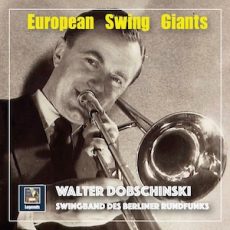
Daily Dose Of Jazz…
Walter Dobschinski was born Dobrzynski on October 29, 1908 in Berlin, Germany. He received formal musical training on piano at the Berlin Conservatory, but concentrated on trombone once he became interested in jazz.
For most of the 1930s he played with Teddy Stauffer, including tours of western Europe and on the ship SS Reliance. In 1939 he worked with Kurt Hohenberger, and was involved with the German Dance and Entertainment Orchestra during World War II. Following the war, he led a swing jazz ensemble for Berliner Rundfunk, recording extensively with this group with Rex Stewart appearing on some of these recordings. He continued leading ensembles in the 1950s.
Trombonist and bandleader Walter Dobschinski, who in his later career concentrated on arranging and composition, died on February 16, 1996 in Berlin.
More Posts: arranger,bandleader,history,instrumental,jazz,music,trombone
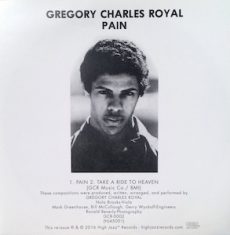
Daily Dose Of Jazz…
Gregory Charles Royal was born on October 10, 1961 IN Washington, D.C. As a student at Howard University he received the 1982 DownBeat Magazine Student Music Award for Jazz Vocal Group and Graduate College Outstanding Performance in the Jazz Instrumental Soloist Category. He graduated from Howard University with a Master of Music in Jazz Studies.
Royal went on to play with the Duke Ellington Orchestra for a decade beginning in 1989, then with Art Blakey and The Jazz Messengers, Slide Hampton and his World of Trombones, and Howard University Jazz Ensemble. He has appeared onstage as a trombonist with the Broadway shows Five Guys Named Moe and Jelly’s Last Jam.
He has written and appeared in a play God Doesn’t Mean You Get To Live Forever, which was presented at the Baruch Performing Arts Center. and at Theatre Row on 42nd Street in New York. Royal also wrote and appeared in the short film World’s Not for Me. The film won the Harlem Spotlight Best Narrative Short Award at the Harlem International Film Festival in 2016.
Trombonist, composer, writer Chuck Royal, who is the co-founder of The BeBop Channel Corporation, the former parent owner of JazzTimes, continues to pursue his career in music.
More Posts: bandleader,composer,history,instrumental,jazz,music,trombone,writer
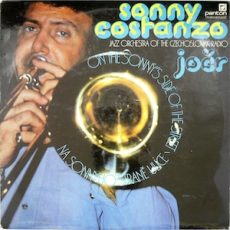
Daily Dose Of Jazz…
Sonny Costanzo was born Dominic on October 7, 1932 in Greenwich Village, New York City, New York. Academically trained, he received additional education from on-the-road experience playing trombone with big bands.
Costanzo was a member of the Clark Terry Big Band, Woody Herman And His Orchestra, Woody Herman And The Swingin’ Herd. He led the Sonny Costanzo Big Band, and the Sonny Costanza Orchestra,
He recorded five albums as a leader or co-leader with Na Sonnyho Straně Ulice, Glenn Zottola, Golden Strings of Prague and the Czech Radio Big Band. Two of them are quartet led.
Trombonist and bandleader Sonny Costanzo died on December 30, 1993 in New Haven, Connecticut.
More Posts: bandleader,history,instrumental,jazz,music,trombone
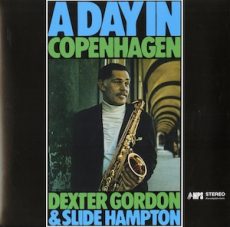
Requisites
A Day in Copenhagen ~ The Dexter Gordon-Slide Hampton Sextet | By Eddie Carter
My appreciation for Dexter Gordon began when I first heard his album Go at one of my uncle Ben’s jazz gatherings during my childhood. The moment I heard Gordon’s rich, full-bodied, and resonant tone, I became an ardent fan of his playing. This morning, I’m exploring the tenor saxophonist in a different setting, paired with trombonist Slide Hampton in a stellar sextet. A Day in Copenhagen (MPS Records MPS 15 230 ST) was originally released in Germany in 1969. Rounding out the ensemble are Dizzy Reece on trumpet, Kenny Drew on piano, Niels-Henning Ørsted Pedersen on bass, and Art Taylor on drums. My copy of this album is the 2023 Worldwide Record Store Day limited edition stereo audiophile reissue (MPS Records 0218937MSW).
The first side kicks off with Kenny’s energetic introduction to My Blues by Slide Hampton. The front line launches into the spirited melody. Dexter takes flight first in an invigorating solo, then Kenny follows with a reading as refreshing as a cool drink on a warm evening. Dizzy adds a brassy bite next, then Niels-Henning gets a moment to shine. Slide makes his point passionately in the following interpretation, and Art steers the group toward the theme’s return and close. You Don’t Know What Love Is by Gene de Paul and Don Raye unfolds with the ensemble’s relaxed medium-paced theme. Slide comes out swinging first. Dexter fuels the following reading with electric energy, then Dizzy comes in for an enthusiastic solo. Dexter offers one final comment before the theme’s reprise and exit.
Slide Hampton’s A New Thing ends the first side with a relaxed, easygoing beat. Art’s introduction sets up the ensemble’s melody. Dexter’s opening solo ventures into fresh musical territory, then Kenny picks up the baton with his own imaginative improvisation. The group then reunites for the theme’s reprise and conclusion. What’s New by Bob Haggart and Johnny Burke is reimagined in a medium-tempo groove to start the second side, offering a fresh platform for the ensemble’s melody and solos. Dexter opens with a silky-smooth performance, then Dizzy builds the second statement exquisitely. Slide takes his turn in the spotlight next. Kenny adds his own inventive touch in the following reading. Niels-Henning closes things with a brief walk before the song ends.
The Shadow of Your Smile by Johnny Mandel and Paul Francis Webster is a quartet performance that unfolds gracefully with subtle elegance. Dexter delivers the melody and opening statement with a delicate touch and gentle finesse. Kenny then speaks softly with quiet sensitivity. Dexter reprises the theme into a soft, gentle ending. A Day In Vienna is a tribute to the Austrian Radio’s Jazz Workshop by Slide Hampton. After the front line kicks things off with an energetic melody, Dexter delivers a commanding opening solo. Dizzy keeps the excitement high with a captivating performance. Slide demonstrates remarkable technical skill and agility next. Niels-Henning’s bass work glides smoothly and gracefully. Finally, Art wraps up with a joyful flourish, guiding the sextet to an enthusiastic closing chorus.
Joachim-Ernst Berendt produced A Day in Copenhagen. Willi Fruth handled the recording supervision, and Birger Swan was the engineer. The album boasts exceptional sound quality, featuring an impressively clear and balanced soundstage in both the treble and midrange, complemented by a deep and well-defined bass. This release showcases the remarkable results that can be achieved through collaborative jazz, with an outstanding lineup of musicians. The album skillfully merges energetic, blues-inspired pieces with tender, evocative ballads, each rendered with exceptional skill and genuine feeling. The extraordinary chemistry among the players is apparent throughout, as each musician’s unique approach enriches the ensemble, all while maintaining a cohesive and unified artistic direction.
If you’re a fan of Dexter Gordon, Slide Hampton, or any of the exceptional musicians in this ensemble, or if you’re searching for a superb record that blends hard-bop and post-bop for your library, I enthusiastically recommend and invite you to check out A Day in Copenhagen by The Dexter Gordon-Slide Hampton Sextet on your next record shop visit. This album beautifully captures the magic of American, Danish, and Jamaican artists coming together in Copenhagen for a memorable jazz session that is likely to become one of your favorites!
~ Go (Blue Note BLP 4112/BST 84112) – Source: Discogs.com ~ The Shadow of Your Smile, What’s New, You Don’t Know What Love Is – Source: JazzStandards.com © 2025 by Edward Thomas CarterMore Posts: choice,classic,collectible,collector,history,instrumental,jazz,music,saxophone,trombone



